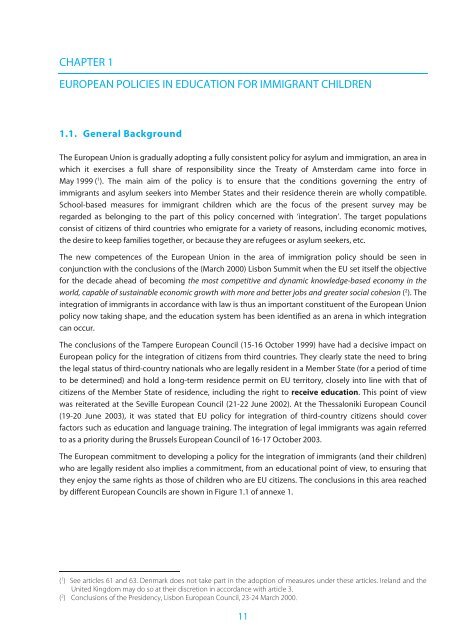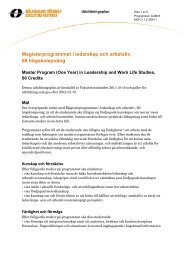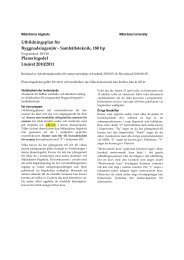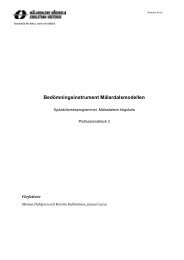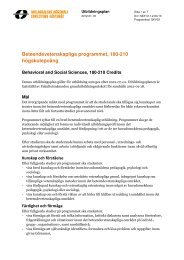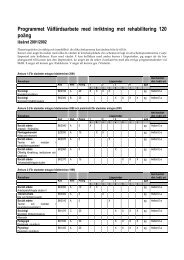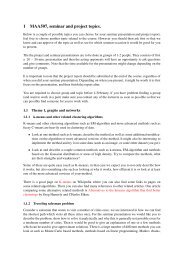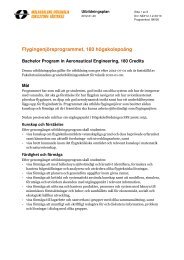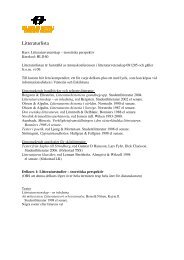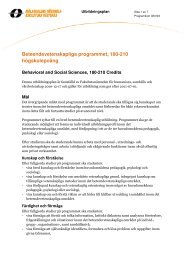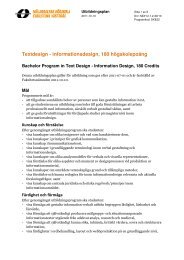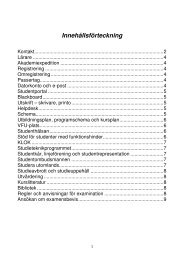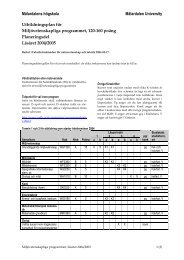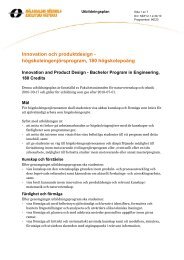CHAPTER 1EUROPEAN POLICIES IN EDUCATION FOR IMMIGRANT CHILDREN1.1. General BackgroundThe <strong>Europe</strong>an Union is gradually adopt<strong>in</strong>g a fully consistent policy for asylum and immigration, an area <strong>in</strong>which it exercises a full share of responsibility s<strong>in</strong>ce the Treaty of Amsterdam came <strong><strong>in</strong>to</strong> force <strong>in</strong>May 1999 ( 1 ). The ma<strong>in</strong> aim of the policy is to ensure that the conditions govern<strong>in</strong>g the entry ofimmigrants and asylum seekers <strong><strong>in</strong>to</strong> Member States and their residence there<strong>in</strong> are wholly compatible.School-based measures for immigrant children which are the focus of the present survey may beregarded as belong<strong>in</strong>g to the part of this policy concerned with ‘<strong>in</strong>tegration’. The target populationsconsist of citizens of third countries who emigrate for a variety of reasons, <strong>in</strong>clud<strong>in</strong>g economic motives,the desire to keep families together, or because they are refugees or asylum seekers, etc.The new competences of the <strong>Europe</strong>an Union <strong>in</strong> the area of immigration policy should be seen <strong>in</strong>conjunction with the conclusions of the (March 2000) Lisbon Summit when the EU set itself the objectivefor the decade ahead of becom<strong>in</strong>g the most competitive and dynamic knowledge-based economy <strong>in</strong> theworld, capable of susta<strong>in</strong>able economic growth with more and better jobs and greater social cohesion ( 2 ). The<strong>in</strong>tegration of immigrants <strong>in</strong> accordance with law is thus an important constituent of the <strong>Europe</strong>an Unionpolicy now tak<strong>in</strong>g shape, and the education system has been identified as an arena <strong>in</strong> which <strong>in</strong>tegrationcan occur.The conclusions of the Tampere <strong>Europe</strong>an Council (15-16 October 1999) have had a decisive impact on<strong>Europe</strong>an policy for the <strong>in</strong>tegration of citizens from third countries. They clearly state the need to br<strong>in</strong>gthe legal status of third-country nationals who are legally resident <strong>in</strong> a Member State (for a period of timeto be determ<strong>in</strong>ed) and hold a long-term residence permit on EU territory, closely <strong><strong>in</strong>to</strong> l<strong>in</strong>e with that ofcitizens of the Member State of residence, <strong>in</strong>clud<strong>in</strong>g the right to receive education. This po<strong>in</strong>t of viewwas reiterated at the Seville <strong>Europe</strong>an Council (21-22 June 2002). At the Thessaloniki <strong>Europe</strong>an Council(19-20 June 2003), it was stated that EU policy for <strong>in</strong>tegration of third-country citizens should coverfactors such as education and language tra<strong>in</strong><strong>in</strong>g. The <strong>in</strong>tegration of legal immigrants was aga<strong>in</strong> referredto as a priority dur<strong>in</strong>g the Brussels <strong>Europe</strong>an Council of 16-17 October 2003.The <strong>Europe</strong>an commitment to develop<strong>in</strong>g a policy for the <strong>in</strong>tegration of immigrants (and their children)who are legally resident also implies a commitment, from an educational po<strong>in</strong>t of view, to ensur<strong>in</strong>g thatthey enjoy the same rights as those of children who are EU citizens. The conclusions <strong>in</strong> this area reachedby different <strong>Europe</strong>an Councils are shown <strong>in</strong> Figure 1.1 of annexe 1.( 1 ) See articles 61 and 63. Denmark does not take part <strong>in</strong> the adoption of measures under these articles. Ireland and theUnited K<strong>in</strong>gdom may do so at their discretion <strong>in</strong> accordance with article 3.( 2 ) Conclusions of the Presidency, Lisbon <strong>Europe</strong>an Council, 23-24 March 2000.11
<strong>Integrat<strong>in</strong>g</strong> <strong>Immigrant</strong> <strong>Children</strong> <strong><strong>in</strong>to</strong> <strong>Schools</strong> <strong>in</strong> <strong>Europe</strong>1.2. <strong>Europe</strong>an Legislation on the Right to Education of <strong>Immigrant</strong> <strong>Children</strong>The 25 July 1977 Directive of the Council constitutes the first legislative measure of the <strong>Europe</strong>anCommunity concern<strong>in</strong>g the education of the children of migrant workers. It relates solely to the childrenof immigrants from the Member States and <strong>in</strong>cludes provision for education adapted to their specialneeds, as well as tuition devoted to their mother tongue and culture of orig<strong>in</strong>. Consideration of thisDirective has been important for countries jo<strong>in</strong><strong>in</strong>g the <strong>Europe</strong>an Union <strong>in</strong> May 2004, <strong>in</strong> that it hassometimes <strong>in</strong>fluenced their national policy for the education of immigrant children.Recent <strong>Europe</strong>an Directives (shown <strong>in</strong> Figure 1.1 of annexe 1) def<strong>in</strong>e immigrant children as m<strong>in</strong>ors whoare nationals of third countries, whether or not they are accompanied. They enjoy certa<strong>in</strong> educationalentitlements which depend on their legal position. Once these entitlements are established by Councildirectives, they have to be <strong>in</strong>corporated <strong><strong>in</strong>to</strong> national legislation before tak<strong>in</strong>g full effect.Accord<strong>in</strong>g to <strong>Europe</strong>an law, m<strong>in</strong>ors who are children of third-country nationals with the status oflong-term residents ( 3 ) have s<strong>in</strong>ce November 2003 received the same treatment as nationals as far aseducation is concerned, <strong>in</strong>clud<strong>in</strong>g the award of study grants ( 4 ). But Member States may restrict thispr<strong>in</strong>ciple of equal treatment, by requir<strong>in</strong>g proof of appropriate language proficiency for access to theeducation system.S<strong>in</strong>ce January 2003, m<strong>in</strong>ors who are children of asylum seekers or are themselves asylum seekershave been able to access the education system under conditions similar to those applicable to citizens ofthe host Member State ( 5 ). Such education may be provided <strong>in</strong> accommodation centres. Access to theeducation system may not be postponed for more than three months once the application for asylum bythe m<strong>in</strong>or or one of his or her relatives has been submitted. However, it may be postponed for a yearwhen special tuition is provided to facilitate access to the system. If access is not possible because of theparticular situation of the m<strong>in</strong>or concerned, the Member State may offer other educational arrangements.In the case of immigrant children who are irregularly present on <strong>Europe</strong>an Union territory, no form ofeducational entitlement is specified <strong>in</strong> <strong>Europe</strong>an legislation.Directive 2000/43/EC is liable to have a bear<strong>in</strong>g on the education of all immigrant children but does notcover differences <strong>in</strong> treatment based on nationality and is without prejudice to the conditions ofresidence of third-country nationals. It seeks to prohibit any discrim<strong>in</strong>ation based on race or ethnic orig<strong>in</strong><strong>in</strong> different areas, <strong>in</strong>clud<strong>in</strong>g education (see article 3). The same Directive entitles immigrant children orchildren of immigrant orig<strong>in</strong> to appeal <strong>in</strong> the event of treatment less favourable than that applicable tonationals (direct discrim<strong>in</strong>ation), or when an apparently neutral provision, criterion or practice would putthem at a disadvantage (<strong>in</strong>direct discrim<strong>in</strong>ation).( 3 ) This status is obta<strong>in</strong>ed after 5 years of cont<strong>in</strong>uous legal residence <strong>in</strong> the Member State, except <strong>in</strong> certa<strong>in</strong> circumstances,assum<strong>in</strong>g those concerned can support themselves f<strong>in</strong>ancially. For further details, see Directive 2003/109/EC, articles 4and 5.( 4 ) See Directive 2003/109/EC, article 11. Denmark, Ireland and the United K<strong>in</strong>gdom do not take part <strong>in</strong> the adoption ofthis Directive.( 5 ) See Directive 2003/9/EC, article 11. Denmark, Ireland and the United K<strong>in</strong>gdom do not take part <strong>in</strong> the adoption of thisDirective.12


